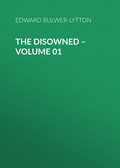
Эдвард Бульвер-Литтон
"My Novel" — Volume 06
CHAPTER IV
Leonard walked sturdily on in the high road to the Great City. The day was calm and sunlit, but with a gentle breeze from gray hills at the distance; and with each mile that he passed, his step seemed to grow more firm, and his front more elate. Oh, it is such joy in youth to be alone with one's daydreams! And youth feels so glorious a vigour in the sense of its own strength, though the world be before and—against it! Removed from that chilling counting-house, from the imperious will of a patron and master, all friendless, but all independent, the young adventurer felt a new being, felt his grand nature as Man. And on the Man rushed the genius long interdicted and thrust aside,—rushing back, with the first breath of adversity, to console—no! the Man needed not consolation,—to kindle, to animate, to rejoice! If there is a being in the world worthy of our envy, after we have grown wise philosophers of the fireside, it is not the palled voluptuary, nor the careworn statesman, nor even the great prince of arts and letters, already crowned with the laurel, whose leaves are as fit for poison as for garlands; it is the young child of adventure and hope. Ay, and the emptier his purse, ten to one but the richer his heart, and the wider the domains which his fancy enjoys as he goes on with kingly step to the Future.
Not till towards the evening did our adventurer slacken his pace and think of rest and refreshment. There, then, lay before him on either side the road those wide patches of uninclosed land which in England often denote the entrance to a village. Presently one or two neat cottages came in sight; then a small farmhouse, with its yard and barns. And some way farther yet, he saw the sign swinging before an inn of some pretensions,—the sort of inn often found on a long stage between two great towns commonly called "The Halfway House." But the inn stood back from the road, having its own separate sward in front, whereon was a great beech-tree (from which the sign extended) and a rustic arbour; so that to gain the inn, the coaches that stopped there took a sweep from the main thoroughfare. Between our pedestrian and the inn there stood, naked and alone, on the common land, a church; our ancestors never would have chosen that site for it; therefore it was a modern church,—modern Gothic; handsome to an eye not versed in the attributes of ecclesiastical architecture, very barbarous to an eye that was. Somehow or other the church looked cold and raw and uninviting. It looked a church for show, —much too big for the scattered hamlet, and void of all the venerable associations which give their peculiar and unspeakable atmosphere of piety to the churches in which succeeding generations have knelt and worshipped. Leonard paused and surveyed the edifice with an unlearned but poetical gaze; it dissatisfied him. And he was yet pondering why, when a young girl passed slowly before him, her eyes fixed on the ground, opened the little gate that led into the churchyard, and vanished. He did not see the child's face; but there was something in her movements so utterly listless, forlorn, and sad that his heart was touched. What did she there? He approached the low wall with a noiseless step, and looked over it wistfully.
There by a grave, evidently quite recent, with no wooden tomb nor tombstone like the rest, the little girl had thrown herself, and she was sobbing loud and passionately. Leonard opened the gate, and approached her with a soft step. Mingled with her sobs, he heard broken sentences, wild and vain, as all human sorrowings over graves must be.
"Father! oh, Father, do you not really hear me? I am so lone, so lone! Take me to you,—take me!" And she buried her face in the deep grass.
"Poor child!" said Leonard, in a half whisper,—"he is not there. Look above!"
The girl did not heed him; he put his arm round her waist gently; she made a gesture of impatience and anger, but she would not turn her face, and she clung to the grave with her hands.
After clear, sunny days the dews fall more heavily; and now, as the sun set, the herbage was bathed in a vaporous haze,—a dim mist rose around. The young man seated himself beside her, and tried to draw the child to his breast. Then she turned eagerly, indignantly, and pushed him aside with jealous arms. He profaned the grave! He understood her with his deep poet-heart, and rose. There was a pause. Leonard was the first to break it.
"Come to your home with me, my child, and we will talk of him by the way."
"Him! Who are you? You did not know him!" said the girl, still with anger. "Go away! Why do you disturb me? I do no one harm. Go! go!"
"You do yourself harm, and that will grieve him if he sees you yonder! Come!"
The child looked at him through her blinding tears, and his face softened and soothed her.
"Go!" she said, very plaintively, and in subdued accents. "I will but stay a minute more. I—I have so much to say yet."
Leonard left the churchyard, and waited without; and in a short time the child came forth, waived him aside as he approached her, and hurried away. He followed her at a distance, and saw her disappear within the inn.
CHAPTER V
"Hip-Hip-Hurrah!" Such was the sound that greeted our young traveller as he reached the inn door,—a sound joyous in itself, but sadly out of harmony with the feelings which the child sobbing on the tombless grave had left at his heart. The sound came from within, and was followed by thumps and stamps, and the jingle of glasses. A strong odour of tobacco was wafted to his olfactory sense. He hesitated a moment at the threshold.
Before him, on benches under the beech-tree and within the arbour, were grouped sundry athletic forms with "pipes in the liberal air."
The landlady, as she passed across the passage to the taproom, caught sight of his form at the doorway, and came forward. Leonard still stood irresolute. He would have gone on his way, but for the child: she had interested him strongly.
"You seem full, ma'am," said he. "Can I have accommodation for the night?"
"Why, indeed, sir," said the landlady, civilly, "I can give you a bedroom, but I don't know where to put you meanwhile. The two parlours and the tap-room and the kitchen are all choke-full. There has been a great cattle-fair in the neighbourhood, and I suppose we have as many as fifty farmers and drovers stopping here."
"As to that, ma'am, I can sit in the bedroom you are kind enough to give me; and if it does not cause you much trouble to let me have some tea there, I should be glad; but I can wait your leisure. Do not put yourself out of the way for me."
The landlady was touched by a consideration she was not much habituated to receive from her bluff customers. "You speak very handsome, sir, and we will do our best to serve you, if you will excuse all faults. This way, sir." Leonard lowered his knapsack, stepped into the passage, with some difficulty forced his way through a knot of sturdy giants in top- boots or leathern gaiters, who were swarining in and out the tap-room, and followed his hostess upstairs to a little bedroom at the top of the house.
"It is small, sir, and high," said the hostess, apologetically. "But there be four gentlemen farmers that have come a great distance, and all the first floor is engaged; you will be more out of the noise here."
"Nothing can suit me better. But, stay,—pardon me;" and Leonard, glancing at the garb of the hostess, observed she was not in mourning. "A little girl whom I saw in the churchyard yonder, weeping very bitterly—is she a relation of yours? Poor child! she seems to have deeper feelings than are common at her age."
"Ah, sir," said the landlady, putting the corner of her apron to her eyes, "it is a very sad story. I don't know what to do. Her father was taken ill on his way to Lunnon, and stopped here, and has been buried four days. And the poor little girl seems to have no relations—and where is she to go? Laryer Jones says we must pass her to Marybone parish, where her father lived last; and what's to become of her then? My heart bleeds to think on it."
Here there rose such an uproar from below, that it was evident some quarrel had broken out; and the hostess, recalled to her duties, hastened to carry thither her propitiatory influences.
Leonard seated himself pensively by the little lattice. Here was some one more alone in the world than he; and she, poor orphan, had no stout man's heart to grapple with fate, and no golden manuscripts that were to be as the "Open-Sesame" to the treasures of Aladdin. By and by, the hostess brought him up a tray with tea and other refreshments, and Leonard resumed his inquiries. "No relatives?" said he; "surely the child must have some kinsfolk in London? Did her father leave no directions, or was he in possession of his faculties?"
"Yes, sir; he was quite reasonable like to the last. And I asked him if he had not anything on his mind, and he said, 'I have.' And I said, 'Your little girl, sir?' And he answered me, 'Yes, ma'am;' and laying his head on his pillow, he wept very quietly. I could not say more myself, for it set me off to see him cry so meekly; but my husband is harder nor I, and he said, 'Cheer up, Mr. Digby; had not you better write to your friends?'
"'Friends!' said the gentleman, in such a voice! 'Friends I have but one, and I am going to Him! I cannot take her there!' Then he seemed suddenly to recollect himself, and called for his clothes, and rummaged in the pockets as if looking for some address, and could not find it. He seemed a forgetful kind of gentleman, and his hands were what I call helpless hands, sir! And then he gasped out, 'Stop, stop! I never had the address. Write to Lord Les—', something like Lord Lester, but we could not make out the name. Indeed he did not finish it, for there was a rush of blood to his lips; and though he seemed sensible when he recovered (and knew us and his little girl too, till he went off smiling), he never spoke word more."
"Poor man," said Leonard, wiping his eyes. "But his little girl surely remembers the name that he did not finish?"
"No. She says he must have meant a gentleman whom they had met in the Park not long ago, who was very kind to her father, and was Lord something; but she don't remember the name, for she never saw him before or since, and her father talked very little about any one lately, but thought he should find some kind friends at Screwstown, and travelled down there with her from Lunnon. But she supposes he was disappointed, for he went out, came back, and merely told her to put up the things, as they must go back to Lunnon. And on his way there he—died. Hush, what's that? I hope she did not overhear us. No, we were talking low. She has the next room to your'n, sir. I thought I heard her sobbing. Hush!"
"In the next room? I hear nothing. Well, with your leave, I will speak to her before I quit you. And had her father no money with him?"
"Yes, a few sovereigns, sir; they paid for his funeral, and there is a little left still,—enough to take her to town; for my husband said, says he, 'Hannah, the widow gave her mite, and we must not take the orphan's;' and my husband is a hard man, too, sir—bless him!"
"Let me take your hand, ma'am. God reward you both." "La, sir! why, even Dr. Dosewell said, rather grumpily though, 'Never mind my bill; but don't call me up at six o'clock in the morning again, without knowing a little more about people.' And I never afore knew Dr. Dosewell go without his bill being paid. He said it was a trick o' the other doctor to spite him."
"What other doctor?"
"Oh, a very good gentleman, who got out with Mr. Digby when he was taken ill, and stayed till the next morning; and our doctor says his name is Morgan, and he lives in Lunnou, and is a homy—something."
"Homicide," suggested Leonard, ignorantly.
"Ah, homicide; something like that, only a deal longer and worse. But he left some of the tiniest little balls you ever see, sir, to give the child; but, bless you, they did her no good,—how should they?"
"Tiny balls, oh—homoeopathist—I understand. And the doctor was kind to her; perhaps he may help her. Have you written to him?"
"But we don't know his address, and Lunnon is a vast place, sir."
"I am going to London and will find it out."
"Ah, sir, you seem very kind; and sin' she must go to Lunnon (for what can we do with her here?—she's too genteel for service), I wish she was going with you."
"With me!" said Leonard, startled,—"with me! Well, why not?"
"I am sure she comes of good blood, sir. You would have known her father was quite the gentleman, only to see him die, sir. He went off so kind and civil like, as if he was ashamed to give so much trouble,—quite a gentleman, if ever there was one. And so are you, sir, I'm sure," said the land lady, courtesying; "I know what gentlefolk be. I've been a housekeeper in the first of families in this very shire, sir, though I can't say I've served in Lunnon; and so, as gentlefolks know each other, I 've no doubt you could find out her relations. Dear, dear! Coming, coming!"
Here there were loud cries for the hostess, and she hurried away. The farmers and drovers were beginning to depart, and their bills were to be made out and paid. Leonard saw his hostess no more that night. The last Hip-hip-hurrah was heard,—some toast, perhaps to the health of the county members,—and the chamber of woe beside Leonard's rattled with the shout. By and by, silence gradually succeeded the various dissonant sounds below. The carts and gigs rolled away; the clatter of hoofs on the road ceased; there was then a dumb dull sound as of locking-up, and low, humming voices below, and footsteps mounting the stairs to bed, with now and then a drunken hiccough or maudlin laugh, as some conquered votary of Bacchus was fairly carried up to his domicile.
All, then, at last was silent, just as the clock from the church sounded the stroke of eleven.
Leonard, meanwhile, had been looking over his manuscripts. There was first a project for an improvement on the steam-engine,—a project that had long lain in his mind, begun with the first knowledge of mechanics that he had gleaned from his purchases of the tinker. He put that aside now,—it required too great an effort of the reasoning faculty to re-examine.
He glanced less hastily over a collection of essays on various subjects, —some that he thought indifferent, some that he thought good. He then lingered over a collection of verses written in his best hand with loving care,—verses first inspired by his perusal of Nora's melancholy memorials. These verses were as a diary of his heart and his fancy,— those deep, unwitnessed struggles which the boyhood of all more thoughtful natures has passed in its bright yet murky storm of the cloud and the lightning-flash, though but few boys pause to record the crisis from which slowly emerges Man. And these first desultory grapplings with the fugitive airy images that flit through the dim chambers of the brain had become with each effort more sustained and vigorous, till the phantoms were spelled, the flying ones arrested, the Immaterial seized, and clothed with Form. Gazing on his last effort, Leonard felt that there at length spoke forth the poet. It was a work which though as yet but half completed, came from a strong hand; not that shadow trembling on unsteady waters, which is but the pale reflex and imitation of some bright mind, sphered out of reach and afar, but an original substance,— a life, a thing of the Creative Faculty,—breathing back already the breath it had received. This work had paused during Leonard's residence with Mr. Avenel, or had only now and then, in stealth, and at night, received a rare touch. Now, as with a fresh eye he reperused it, and with that strange, innocent admiration, not of self—for a man's work is not, alas! himself,—it is the beautified and idealized essence, extracted he knows not how from his own human elements of clay; admiration known but to poets,—their purest delight, often their sole reward. And then with a warmer and more earthly beat of his full heart, he rushed in fancy to the Great City, where all rivers of fame meet, but not to be merged and lost, sallying forth again, individualized and separate, to flow through that one vast Thought of God which we call THE WORLD.
He put up his papers; and opened his window, as was his ordinary custom, before he retired to rest,—for he had many odd habits; and he loved to look out into the night when he prayed. His soul seemed to escape from the body—to mount on the air, to gain more rapid access to the far Throne in the Infinite—when his breath went forth among the winds, and his eyes rested fixed on the stars of heaven.
So the boy prayed silently; and after his prayer he was about, lingeringly, to close the lattice, when he heard distinctly sobs close at hand. He paused, and held his breath, then looked gently out; the casement next his own was also open. Someone was also at watch by that casement,—perhaps also praying. He listened yet more intently, and caught, soft and low, the words, "Father, Father, do you hear me now?"
CHAPTER VI
Leonard opened his door and stole towards that of the room adjoining; for his first natural impulse had been to enter and console. But when his touch was on the handle, he drew back. Child though the mourner was, her sorrows were rendered yet more sacred from intrusion by her sex. Something, he knew not what, in his young ignorance, withheld him from the threshold. To have crossed it then would have seemed to him profanation. So he returned, and for hours yet he occasionally heard the sobs, till they died away, and childhood wept itself to sleep.
But the next morning, when he heard his neighbour astir, he knocked gently at her door: there was no answer. He entered softly, and saw her seated very listlessly in the centre of the room,—as if it had no familiar nook or corner as the rooms of home have, her hands drooping on her lap, and her eyes gazing desolately on the floor. Then he approached and spoke to her.
Helen was very subdued, and very silent. Her tears seemed dried up; and it was long before she gave sign or token that she heeded him. At length, however, he gradually succeeded in rousing her interest; and the first symptom of his success was in the quiver of her lip, and the overflow of her downcast eyes.
By little and little he wormed himself into her confidence; and she told him in broken whispers her simple story. But what moved him the most was, that beyond her sense of loneliness she did not seem to feel her own unprotected state. She mourned the object she had nursed and heeded and cherished, for she had been rather the protectress than the protected to the helpless dead. He could not gain from her any more satisfactory information than the landlady had already imparted, as to her friends and prospects; but she permitted him passively to look among the effects her father had left, save only that, if his hand touched something that seemed to her associations especially holy, she waved him back, or drew it quickly away. There were many bills receipted in the name of Captain Digby, old yellow faded music-scores for the flute, extracts of Parts from Prompt Books, gay parts of lively comedies, in which heroes have so noble a contempt for money,—fit heroes for a Sheridan and a Farquhar; close by these were several pawnbroker's tickets; and, not arrayed smoothly, but crumpled up, as if with an indignant nervous clutch of the helpless hands, some two or three letters. He asked Helen's permission to glance at these, for they might afford a clew to friends. Helen gave the permission by a silent bend of the head. The letters, however, were but short and freezing answers from what appeared to be distant connections or former friends, or persons to whom the deceased had applied for some situation. They were all very disheartening in their tone. Leonard next endeavoured to refresh Helen's memory as to the name of the nobleman which had been last on her father's lips; but there he failed wholly. For it may be remembered that Lord L'Estrange, when he pressed his loan on Mr. Digby, and subsequently told that gentleman to address him at Mr. Egerton's, had, from a natural delicacy, sent the child on, that she might not witness the charity bestowed on the father; and Helen said truly that Mr. Digby had sunk latterly into an habitual silence on all his affairs. She might have heard her father mention the name, but she had not treasured it up; all she could say was, that she should know the stranger again if she met him, and his dog too. Seeing that the child had grown calm, Leonard was then going to leave the room, in order to confer with the hostess, when she rose suddenly, though noiselessly, and put her little hand in his, as if to detain him. She did not say a word; the action said all,—said, "Do not desert me." And Leonard's heart rushed to his lips, and he answered to the action, as he bent down, and kissed her cheek, "Orphan, will you go with me? We have one Father yet to both of us, and He will guide us on earth. I am fatherless like you." She raised her eyes to his, looked at him long, and then leaned her head confidingly on his strong young shoulder.







